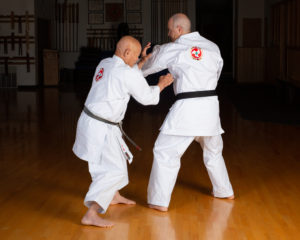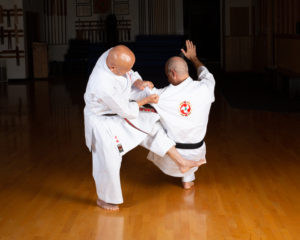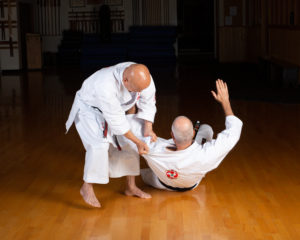Bunkai
Sōke Kaichō Kinjō believes that the movements of a kata should finish the opponent in such a way that he cannot fight again. Even though a kata is an imaginary battle, the student should practice as though his life depends on the outcome of the battle. He or she should have an image in mind of the attack and how one can defend against it. The goal is to finish the opponent in such a way that he cannot continue to fight.
The word bunkai (分解) means “analysis.” While beginning students are offered basic explanations of the movements of the kata, advanced students have the freedom to explore the secrets of the kata and create their own bunkai for the kata.
Bunkai is performed with a partner to learn timing and distance, grabbing for control, simultaneous block and attack – all the same lessons as taisabaki waza. Instead of focusing on just one small aspect of a kata at a time, bunkai puts it all together into a no-longer-imaginary mock battle. A bunkai performed by advanced partners will have true fighting spirit.
Why Practice Bunkai?
Sōke Kaichō Kinjō has revised the kata so that every movement has a practical application. Nothing exists in the kata just for show. Just as there are beginning, intermediate and advanced levels of the kata, there are also beginning, intermediate and advanced bunkai.
Sōke Kaichō Kinjō believes that one should perform a kata with the feeling that ones life depends on it. Have an image in your mind of the attack and how you can defend against it. Finish the opponent in such a way that he cannot continue to fight
As much as possible go to the outside on bunkai.
On Ko Chi Shin 温故知新
- By exploring the old one becomes able to understand the new.
- Take a lesson from the past.
- Learn something old and then see it from a different point of view; gain insight
Rinki-ōhen 臨機応変
Adaptation to circumstances.
Rin – to face or to be confronted by
Rinki ni – extemporaneously; impromptu
- Be able to adapt to circumstances and take appropriate measures
- Be able to adapt oneself to the requirements of the moment and take measures suited to the occasion
- Take proper steps to meet the situation
- Take such steps as the occassion demands
- To be full of resources in an emergency
Develop the flexibility of mind to adjust to any situation by practicing kata. Perform kata over and over until you make it your own. Then you will be naturally able to take appropriate action depending on the circumstances. The kata will teach you, but you must think and understand what’s going on rather than performing mindless repetition.
Kufū 工夫 An idea; a device; an invention; a scheme; a means
Sōi Kufū 相違工夫 A new and original idea
Adapt; make it your own
The key to success in karate is to plan your day to allow time to practice on your own. Enjoy your time alone spent training, conditioning, kata, etc.
Practice and from your practice you can gain new insight.



